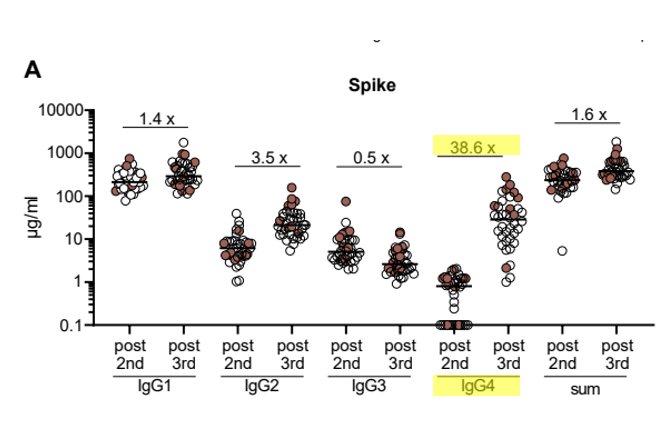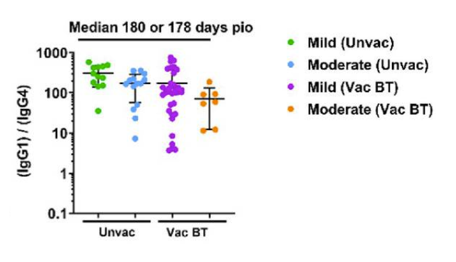
Training the immune system to tolerate spike protein?
One of the treatments available for people with severe allergies is “desensitisation”, which involves repeated injection of small amounts of the offending antigen.
These repeated injections are designed to fool the immune system into thinking that the antigen is not foreign, and hence should be ignored.
When people suffer from severe allergies to substances they cannot practically avoid, desensitisation is useful and offered as treatment. However, such an induced state of tolerance would not be beneficial to the response to a pathogen such as a virus; in this case, stunting the immune response to the main antigen by which the body recognises the virus would be likely to prolong infections and could result in more severe symptoms.
Hence there has always been a theoretical risk that repeated mRNA injections – resulting in the cellular production of “Wuhan spike” – would induce an unhelpful state of tolerance.
There are several types (“classes”) of antibodies generated by the immune system in response to foreign antigens. Upon repeated exposure, the proportion of antibodies which are of the IgG4 type become predominant. It is thought that these act to signal to the immune system that the antigen is safe and should be “tolerated”.
Over the past few weeks, a number of papers have been published which do indeed suggest that such an effect is occurring with repeated mRNA injections.
The first such paper on the matter entitled “Class switch towards non-inflammatory IgG isotypes after repeated SARS-CoV-2 mRNA vaccination” was published as a pre-print by a German group as long ago as July 2022, and can be found here.

Figure 1: Results from German study showing more than a 38 fold increase in IgG4 levels from 2nd to 3rd doses
That article went largely unnoticed (an exception being this substack by Brian Mowrey who writes as “Unglossed”), until an author who blogs as “Rintrah” published an essay about its results and implications in November 2022.
A team in Singapore then published this paper in November 2022, essentially confirming the key findings of the German study.

Figure 2: Results from Singapore study showing ratios of protective and tolerant IgG classes in mild and moderately infected unvaccinated people and mild and moderately infected vaccinated people with breaththrough infection
Rintrah then wrote a follow-up piece reporting on both studies and this can be found here.
There is really no point in describing the results of these studies further here as so much has been written about this issue already. As well as the essays by “Rinrah” linked above, Igor Chudov has written about it here, and in this follow-up piece he points out that the Singapore paper suggests that tolerance appears to be starting after only 2 doses.
In summary, analysis of antibodies taken from those multiply injected with mRNA strongly suggest a potentially concerning “class-switch” towards the type of antibodies associated with immunological tolerance of spike protein.
These findings are, of course, entirely consistent with the evidence of booster failure (see HART’s article from last week), and the anecdotal reports of very prolonged viral illnesses in the heavily vaccinated of which everyone seems to be becoming aware.
This latest debacle – following on from so many we have witnessed already – represents yet another serious regulatory failing. This issue was entirely predictable through the application of basic immunological knowledge. Instead of caution in recommending booster after booster, regulators have ploughed on, basing their decision merely on small-scale studies which showed the generation of antibodies in a very small number of subjects or even just in a few mice. This over-simplistic approach is like taking a sledgehammer to a swiss watch.
The human immune and clotting systems are both highly evolved, complex, extremely efficient, and incompletely understood. Adverse events – many serious – in both systems appear to have been frequently caused by the Covid vaccines. Tinkering with the fundamental workings of these systems was always an extremely dangerous thing to undertake even with large-scale clinical trials, but to do it without such extensive studies of the potential risks can only be regarded as reckless.

